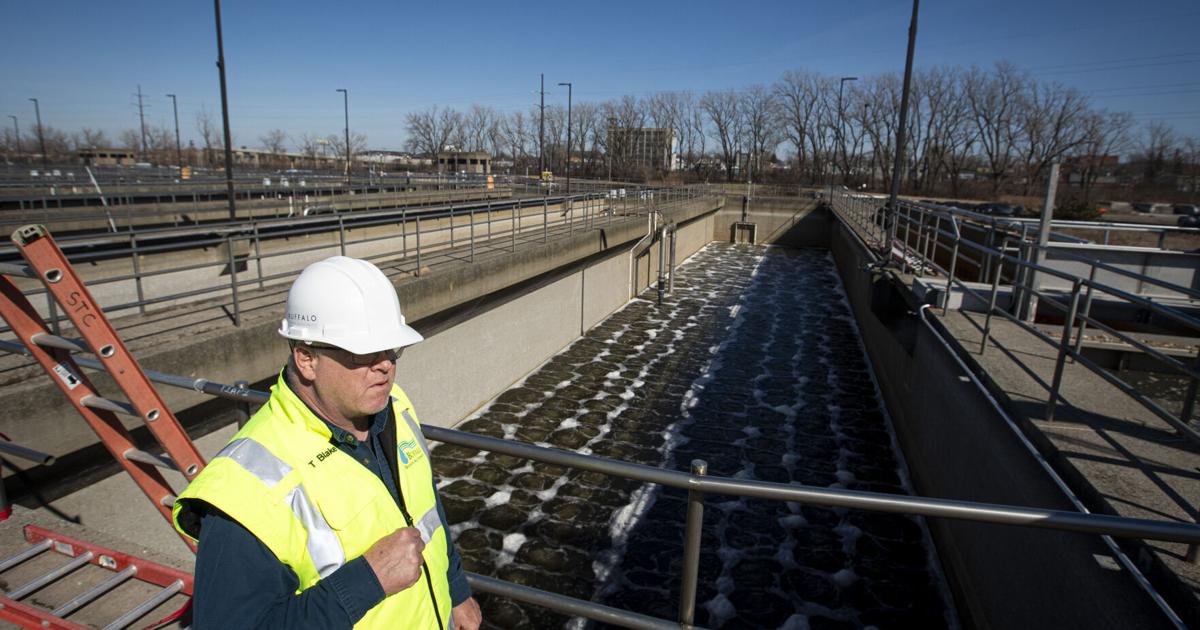
A lawsuit filed this week against the Buffalo Sewer Authority may ultimately help give the group more time to fix the problem of raw sewage polluting local waterways.
The Buffalo Sewer Authority already said it won’t meet a 20-year deadline to upgrade its sewer system to prevent untreated sewage from entering the Buffalo River, Scajaquada Creek, Lake Erie and other local bodies of water.
The DEC’s suit will kick-start a formal process that could give the Sewer Authority the time it needs.
Tuesday’s lawsuit, filed in Erie County Supreme Court, is expected to be settled relatively quickly, according to someone familiar with the matter who spoke on the condition of anonymity due to the pending litigation. The Buffalo Sewer Authority board voted in July to approve a settlement with the DEC that will give the authority until 2040 to implement necessary upgrades to its sewer system.
In 2014, the Buffalo Sewer Authority began what was supposed to be a 20-year plan with the U.S. Environmental Protection Agency to reduce the amount of sewage and stormwater runoff that flows from the city’s combined sewer system and into local creeks and rivers. The authority was accused at the time of violating the federal Clean Water Act and its state discharge permit by failing to reduce the sewage pollution overflowing into the Niagara River, Black Rock Canal, Buffalo River, Scajaquada Creek, Cazenovia Creek, Cornelius Creek and Lake Erie basin.
In 2014, the Buffalo Sewer Authority was given a deadline of 2034 to complete construction projects to bring it into compliance with the Clean Water Act and its state permit.
“Over the past decade it has become clear that some projects in the 2014 LTCP could not be constructed as envisioned and that the water quality goals would not be met through its completion,” the Buffalo Sewer Authority wrote in an emailed statement on Wednesday.
In April, Buffalo Sewer Authority officials told The Buffalo News they had been negotiating with the DEC and U.S. Environmental Protection Agency to extend the timeline to 2040.
Listen now and subscribe: Apple Podcasts | Spotify | RSS Feed | SoundStack | All Of Our Podcasts
Those negotiations appear to have culminated in the lawsuit filed Tuesday by the DEC.
The Buffalo Sewer Authority had 20 years and an estimated $380 million to reduce the amount of raw sewage overflows plaguing the city from its century-old system. Now, officials at the sewer authority said they’ll need more time, and a lot more money – $1 billion in total – to get the job done.
Once a settlement is reached regarding the new timeline, the Buffalo Sewer Authority can then apply for necessary state and federal grant money to help fund its system upgrades.
“At this time, we are implementing an effort announced in October 2024 – the Queen City Clean Waters Initiative – to improve our wastewater treatment and combined sewer overflow (CSO) systems to reduce these discharges to meet those water quality goals,” the authority wrote in its statement. “The Queen City Clean Waters initiative is a 15 year, one-billion-dollar-plus effort to make various infrastructure improvements at over fifty sites across our service territory.”
The upgrades were expected to cost $380 million in 2014, but costs have since ballooned to more than $1 billion, according to reporting by The News in April.
The Buffalo Sewer Authority has been working to upgrade its 1930s-era Bird Island Wastewater Treatment Plant as well as implementing dozens of sewer system projects around the city.
The upgrades to the wastewater treatment plant are expected to cost around $250 million.
The remaining $750 million will be spent on various small projects – such as improving tree root wells, installing rain gardens and porous pavement – and some large projects including underground stormwater storage systems.
“We remain resolute in our mission of protecting the public health for our approximately 550,000 customers across our service territory and fulfilling our obligation in meeting all state and federal quality water standards,” the authority wrote in its statement.
The DEC’s lawsuit on Tuesday also alleged the Buffalo Sewer Authority violated its permit in 2024 at least 11 times when it discharged partially treated sewage from its main outfall during dry weather and did not properly notify the DEC.
Reach climate and environment reporter Mackenzie Shuman at mshuman@buffnews.com or 716-715-4722.
Get local news delivered to your inbox!
Subscribe to our Daily Headlines newsletter.
* I understand and agree that registration on or use of this site constitutes agreement to its user agreement and privacy policy.
Mackenzie Shuman
Environment and climate reporter
Get email notifications on {{subject}} daily!
Your notification has been saved.
There was a problem saving your notification.
{{description}}
Email notifications are only sent once a day, and only if there are new matching items.
Followed notifications
Please log in to use this feature
Log In
Don’t have an account? Sign Up Today



